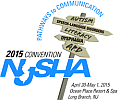Effects of Accented Speech on Semantic Processing in Adverse Listening Conditions
Thursday, 11:00am to 1:00pm
Seabright
Poster 1
We examined how non-native accents affect speech intelligibility in the presence of two-talker babble at various signal-to-babble ratios (SBRs). Also, we observed how semantic priming (related vs. unrelated sentences) interacts with talker accent (native vs. foreign talker).
Eight subjects between the ages of 18 and 30 with normal hearing sensitivity were included in this study. We presented 25 high predictability SPIN sentences for each condition (related native; unrelated native; related foreign; unrelated foreign). The unrelated sentences were created by shuffling the final words and reassigning them to a different sentence stem. The sentences were produced by one non-native and one native English speaker. The subjects were required to transcribe the final word of each sentence on a response sheet, and a percent correct score was calculated.
Foreign accent impacted intelligibility in babble only at the most difficult SBR (-8 dB SBR) in the unrelated condition. However, babble did not affect intelligibility of the foreign accented speech in the easier SBRs (-4, 0, and +4dBSBR). Subjects performed significantly better in the related condition than in the unrelated condition regardless of babble level or accent.
Foreign accent results in deterioration of speech understanding to a greater extent when background babble is highly intrusive and semantic context is unknown. By providing context when there is background noise present, intelligibility of a foreign talker can be significantly improved. However, when the background noise is too loud (-8dBSBR), semantic context does not completely eliminate the effect of a foreign accent.
Track:
Audiology
